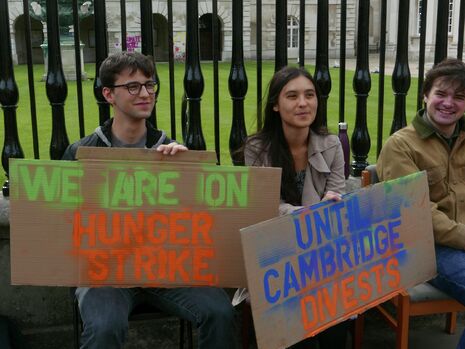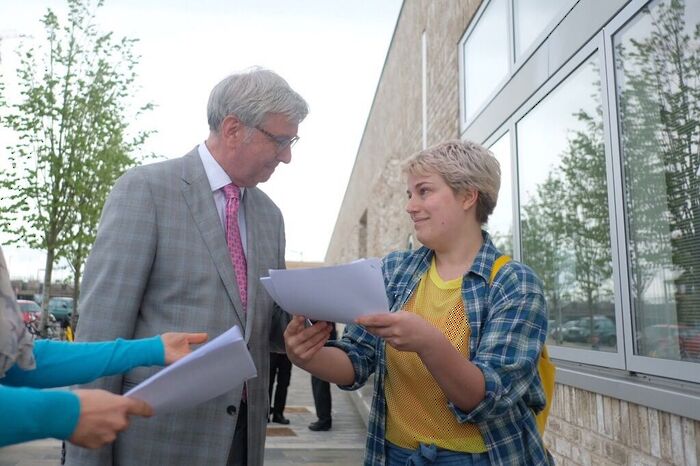Students embark on hunger strike in bid to pressure Cambridge to divest
Several Zero Carbon members are striking ahead of the University Council meeting on Monday, where Council will come closer to a decision on divestment

Three members of the Cambridge Zero Carbon Society have gone on hunger strike to put pressure on the University Council to decide to divest from fossil fuels in its meeting next week.
The strikers, Sam Warren-Miell, Ben Margolis and Beth Bhargava are all first year undergraduates, and have pledged to continue their strike until the University commits to “full divestment from fossil fuels by the year 2022,” in both their direct and indirect investments.
Warren-Miell told Varsity he feels that a “hunger strike is the most serious tactic of direct action available to us in this moment of absolute emergency in the life of the University.”
Margolis spoke of the urgency of the decision, and said the importance of divestment is in protecting “future generations.” In a press release, he said “unless decisive action is taken quickly, we’re heading for a global temperature increase of over two degrees which will be a catastrophe for the whole of humanity in our lifetimes.”
Bhargava echoed a similar sentiment to Varsity, and added that it is “important to note” the effectiveness of hunger strikes in other institutions, with a student at King's College London striking for “two weeks prior to divestment.” In a press release, she said Cambridge “must set a positive example by initiating the divestment process.”
Regarding the hunger strike, a spokesperson for the University of Cambridge said:“We are aware of an ongoing protest outside Senate House yard. We are monitoring the situation and the wellbeing of the students involved.”
The students have also demanded “no punishment for the students who have engaged in recent direct action for divestment.” This refers in part to a protest that occured on Monday, which saw 30 Zero Carbon activists spray paint pro-divestment slogans and symbols on the walls of the Old Schools. In his open meeting yesterday, Toope noted that participants could be subject to the University’s disciplinary procedure.
The University Council will come to a decision based on evidence presented in a report by the University of Cambridge Divestment Working Group, which was set up in May 2017 to explore whether or not the University should divest.
In March, a student representative to the working group, Alice Guillaume, resigned in protest after a leaked copy of an earlier draft of the report recommended only partial divestment of the University’s endowment.
The working group’s report was presented to Council members last month at a meeting that was met with a demonstration by 40 campaigners. A few days prior, Zero Carbon activists broke into the University’s finance office and prevented staff from entering.
 News / Judge Business School advisor resigns over Epstein and Andrew links18 February 2026
News / Judge Business School advisor resigns over Epstein and Andrew links18 February 2026 News / Gov grants £36m to Cambridge supercomputer17 February 2026
News / Gov grants £36m to Cambridge supercomputer17 February 2026 News / Hundreds of Cambridge academics demand vote on fate of vet course20 February 2026
News / Hundreds of Cambridge academics demand vote on fate of vet course20 February 2026 News / CUCA members attend Reform rally in London20 February 2026
News / CUCA members attend Reform rally in London20 February 2026 News / Union speakers condemn ‘hateful’ Katie Hopkins speech14 February 2026
News / Union speakers condemn ‘hateful’ Katie Hopkins speech14 February 2026










